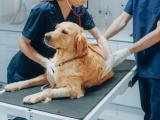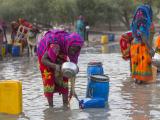Jul 18, 2012
USDA reports first round of non-O157 E coli testing for beef trim
The US Department of Agriculture (USDA) recently posted the first results from its new non-O157 Escherichia coli testing program for beef trim destined for ground beef. According to totals posed by the USDA's Food Safety and Inspection Service (FSIS), 110 samples have been tested, and 3 positive findings were found, translating to 2.7% positive. Four years after it began considering testing ground beef trim for E coli strains other than O157, the USDA launched the testing program on Jun 4. The tests target six E coli strains: O26, O45, O103, O111, O121, and O145. The US Centers for Disease Control and Prevention has said the non-O157 strains cause about 112,000 infections each year. The three positive samples identified in the first round of tests were O26, O103, and O145. The USDA's testing plans for the six additional strains will eventually extend to finished ground beef. In earlier
statements, the FSIS estimated that about 2% of beef trim samples would test positive in screening tests, with a "significantly lower" percentage confirmed.
Jul 13 FSIS testing results
May 29 CIDRAP News story "USDA poised to start testing beef for non-O157 E coli"
Haiti's cholera vaccination drive reached 90% of target population
A pilot program to vaccinate 100,000 Haitians against cholera this past spring reached almost 90% of the target population with the full two-dose regimen, National Public Radio (NPR) reported yesterday. The effort far surpassed the predictions of skeptics who had said that it would be lucky to vaccinate 60% of the target groups, according to the story. The nonprofit medical groups that sponsored the project—GHESKIO and Partners in Health—presented the results Jul 16 to Haiti's health minister, Florence Guillaume, MD. The two groups said the success of the program has done much to counter doubts about vaccination as part of the strategy for fighting cholera in Haiti, which has had about 560,000 cases and 7,300 deaths since the fall of 2010. The government previously opposed vaccination, saying resources should be used to treat the sick and improve water and sanitation. But Jean William Pape, MD, of GHESKIO told NPR,
"The minister of health is convinced that, based on these results, at-risk populations should receive oral cholera vaccine as part of a global strategy," along with improved sanitation and access to clean water. The immunization drive focused on a Port-au-Prince slum and a remote rural area. Health workers who conducted the drive reported nearly 100% acceptance of the vaccine, and 90% of those who received one dose got the second one as well.
Jul 17 NPR story
Cambodia, Thailand close schools to slow HFMD spread
Cambodia and Thailand are battling outbreaks of hand, foot, and mouth disease (HFMD) by closing schools, according to media reports. Cambodia has closed more than 2,700 kindergartens and 7,000 primary schools 2 weeks before a regular vacation to try to slow the spread of a deadly form of HFMD caused by enterovirus 71 (EV-71), the Associated Press (AP) reported today. More than 50 Cambodian children died of EV-71 infections recently, the country's health ministry and the World Health Organization said last week.
Jul 18 AP story
Jul 12 CIDRAP News story on EV-71 infections
In Thailand, at least 29 schools in Bangkok have suspended classes or shut down entirely to help stem HFMD, the Bangkok-based The Nation reported today. The country has seen almost
14,000 HFMD cases, according to a separate Nation article. A top health official there said the disease has not been caused by a new strain, with most cases attributed to Coxsackievirus A6, though he did say EV-71 is circulating in Thailand. The official, Dr Rungruang Kitpati of the nation's Disease Control Department, said HFMD is expected to continue to spread for about 6 more weeks.
Jul 18 Nation story on school closings
Jul 18 Nation article on HFMD cases
Study: Public reporting of C difficile linked to drop in hospital cases
Public reporting of Clostridium difficile hospital infections in Ontario was associated with a drop in cases by one-fourth, according to a study in PLoS Medicine yesterday. Toronto researchers analyzed data on all patients 1 year old or older admitted to 180 provincial acute-care hospitals from Apr 1, 2002, through Mar 31, 2010. They also developed a model to predict hospital- and age-specific monthly rates of C difficile cases based on Poisson regression. They then compared rates before and after public reporting of the disease was instituted in the hospitals. The researchers found that pre-intervention rates increased from 7.01 per 10,000 patient-days in 2002 to 10.79 in 2007. In the first year after public reporting began, the case rate per 10,000 patient-days dropped to 8.92, compared with a predicted rate of 12.16. The team determined that public reporting of C difficile infection
over this period was associated with a 26.7% reduction in cases. They conclude, "Future research will be required to discern the direct mechanism by which C difficile infection rates may have been reduced in response to public reporting."
Jul 17 PLoS Med study
PATH to support testing of Novavax's RSV vaccine
Novavax Inc. announced today that the nonprofit health organization PATH will support development of the company's vaccine for respiratory syncytial virus (RSV), starting with about $2 million for a phase 2 clinical trial this year. "Following this initial study, PATH may elect to continue to partner with Novavax and provide support for the external clinical development costs through commercialization for this indication," the Rockville, Md., company said in a press release. The vaccine is described as a recombinant nanoparticle product composed of a highly purified RSV fusion protein. In a phase 1 trial last year involving young adults, the vaccine was well-tolerated and induced a significant antibody response compared with a placebo, the company said. The phase 2 trial will evaluate the immune response to different dose levels in women of child-bearing age. PATH and Novavax may then continue developing the vaccine with the goal of
immunizing pregnant women so that maternal RSV antibodies will be transmitted to their offspring before birth, potentially providing protection during early infancy. The company said RSV is the most common cause of childhood infection globally, with 64 million cases and 160,000 deaths annually.
Jul 18 Novavax press release
















